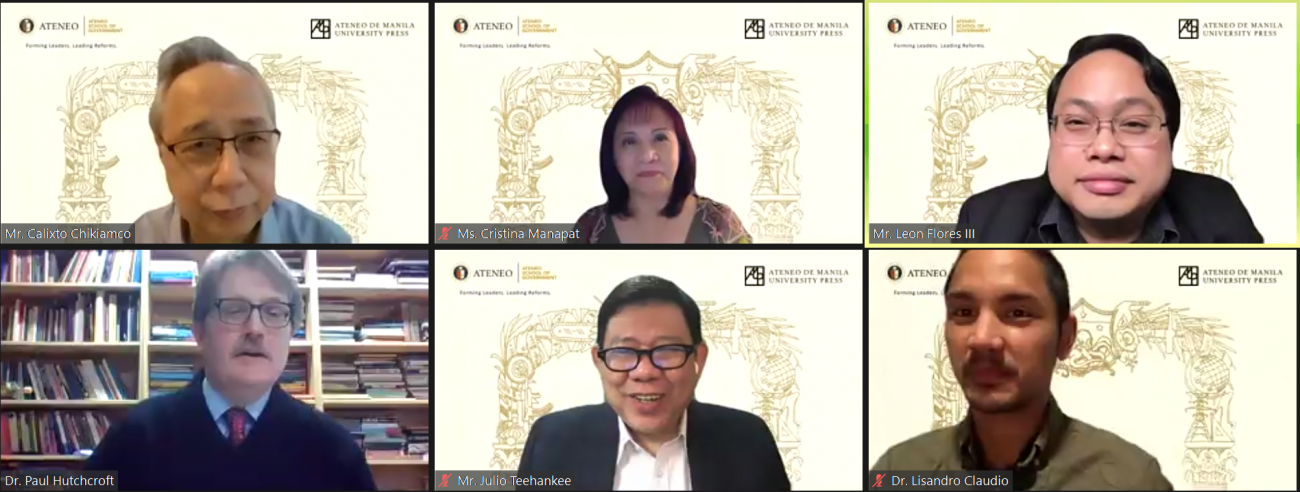Oligarchy Then and Now: Manapat's Some are Smarter than Others Reissued
26 Aug 2020
On August 14, 2020, The Ateneo School of Government and Ateneo de Manila University Press held a webinar and book launch titled "Oligarchy Then and Now: Manapat's Some are Smarter than Others Reissued." The webinar marked the issue of the print and e-book versions of "Some Are Smarter Than Others: The History of Marcos' Crony Capitalism" - a book by Ricardo Manapat. The webinar also provided a timely and relevant discussion on oligarchy and crony capitalism in the Philippines, using Manapat’s reissued book as a reference to show the continuing legacy of the Marcos dictatorship in Philippine politics and economy even after 34 years since it ended.
Mr. Leon Flores III, a Professor of Praxis at the Ateneo School of Government, moderated the webinar. He opened the session by sharing how the book first started as a 40-paged pamphlet famously called “The Octopus” and was later reproduced to 2000 copies to help expose the wealth and corruption of the Marcoses and their cronies. He emphasized that reissuing the book is more timely now than ever, especially with the renewed discourse in light of President Duterte’s repeated pronouncements on dismantling the oligarchy.
Ms. Maria Cristina Manapat, the youngest sister of the author, shared a personal story about her brother and the latter’s journey as an activist. According to her, Ric Manapat started his activism as a KASAPI member where he experienced joining rallies and demonstrations to fight for the rights of jeepney drivers, laborers, and farmers even at the expense of getting arrested or detained. She underscored that her brother’s values are important lessons for today’s youth: the importance of “having a socio conscience, being responsible for societal change" and being the change. She ended by encouraging everyone “to walk in Ric’s shoes as well as to take up and be a part of the struggle against greed and corruption in the world.”
Mr. Calixto Chikiamco is a renowned political economist and the president of the Foundation for Economic Freedom. Mr. Chikiamco described oligarchy during the Marcos administration as both historical and geopolitical; noting that it is a product of the country’s historical past and it was the events during that time that allowed Marcos and his cronies to stay in power and their corrupt activities.
Dr. Julio Teehankee is a Professor and a Research Fellow of Political Science and International Studies at De La Salle University. Dr. Teehankee shared several definitions of oligarchy based on various scholars, highlighting that oligarchs are basically extremely wealthy individuals who use their resources (such as political power) to protect and enhance their wealth. Dr. Teehankee also made an insightful comparison with South Korea where the oligarchs or the so-called chaebols compete among themselves to get support from the state while in the case of the Philippines, the decision solely rested on former President Marcos himself.
Dr. Paul Hutchcroft is a professor at the Department of Political and Social Change at the Australian National University. Picking up from Dr. Teehnakee’s discussion, Dr. Hutchcroft discussed the failure of the past administrations to "level the playing field." While the Ramos administration attempted to make economic reforms to level the playing field, political and institutional reforms remained to be a challenge.
Dr. Lisandro Claudio is a professor at the Department of South and Southeast Asian Studies at the University of California, Berkeley. Dr. Claudio said the ghost of crony capitalism from Marcos' administration is still felt today. He stressed that it is what's limiting our economic imagination. For example, because of our experiences during the Marcos’ administration, we automatically associate borrowing money to corruption and rent-seeking. He further noted that this is the reason why our lawmakers are still hesitating to pass a bill that would provide economic stimulus package to millions of Filipinos (even in this time of global pandemic) because it would entail borrowing.
The webinar concluded with the short reactions from notable student leaders. JR Gomez of the Ateneo de Zamboanga University shared his thoughts on the lack of opportunity to learn about the excesses in wealth and power of the Marcoses because this was not taught in school. He mentioned that the lack of access to information could be a reason why young people “remain susceptible to historical revisionism and fake news, especially at a time when we [literally] live online.”
On the other hand, Kara Angan of ADMU stressed that in order for history to not repeat itself, it takes a change in systems like crony capitalism and inequality in the Philippines more than a change in figureheads.
